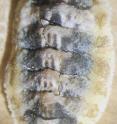Advance in chromosomal evolution in sea cradles
The study of chromosome changes arisen during species evolution is a current and intriguing topic that evolutionary biology proposes. However, in several groups (for example, molluscs), and chitons in particular, chromosome studies are scarce, with a few species investigated and analyses performed mostly with simple methods. Only 2,5% of about 900 living species of chitons have been so far karyologically investigated, all of them in the same order (Chitonida). The authors note that the species of suborder Chitonina all have a karyotype of 2n=24 chromosomes, all biarmed, that is metacentric or submetacentric. The species studied by the authors, formerly included in Chitonida, also possesses 2n=24 elements, but many are uniarmed and, therefore, resembling to the chromosome complement of species of the suborder Acanthochitonina. This provides support to recent attribution of the studied sea cradle to the latter suborder.
Furthermore, the comparison among the karyotypes of the suborder Acanthochitonina allows the authors to propose that in this group of chromosome changes mainly occurred by fusion among uniarmed elements. This kind of change is that mainly involved in chromosome animal evolution. The study was published in the open access journal Comparative Cytogenetics.
Source: Pensoft Publishers
Other sources
- Advance in chromosomal evolution in sea cradlesfrom Science DailyWed, 12 Dec 2012, 17:00:50 UTC
- Advance in chromosomal evolution in sea cradlesfrom PhysorgWed, 12 Dec 2012, 16:01:10 UTC
